23 May2019
By Ward Cummings

The Department of Education is seeking Hispanic-Serving Institutions (HSIs) applicants to apply for a portion of a new $24 million developmental grant created to address low completion rates among Hispanic postsecondary students.
This new grant is open to all HSIs that demonstrate a commitment to developing ways to identify and address the strengths and weaknesses of their institution’s enrollment, retention, and support for Hispanic and low-income students. The Department of Education will support projects designed to expand the number of Hispanic students at the undergraduate, graduate, and professional level and that help to facilitate their rates of graduation. HSI programs hoping to use the grant to expand and enhance the academic offerings, program quality, faculty quality, and institutional stability of colleges and universities that serve a majority of Hispanic students are encouraged to apply.
Awards will not exceed $600,000 for a single budget period of 12 months. The deadline for applying for these FY19 awards is July 15, 2019.
Those institutions interested in applying are encourages to visit grants.gov.
Do you have questions about this announcement? Please contact me at wcummings@aacte.org.
23 May2019
By Matthew Wales

Academic leaders from across the country are preparing to gather in Pittsburgh, PA, for AACTE’s annual Leadership Academy. In one month, attendees will experience an interactive and engaging professional development opportunity designed to advance their leadership skills while exploring a wide range of topics. And even if you have attended in the past, you should consider returning this year, June 23-27, as the program has once again integrated new content into the curriculum (view the full schedule).
Academy faculty first redesigned the content of the popular “Managing Conflict” sessions in 2017 by incorporating avatars into the program. Faced with difficult conversations and topics likely to occur in an academic environment, groups of job-alike attendees collaborate to design effective responses to the scenarios proposed. Their conflict-response plans are tested in simulated encounters, as volunteers meet with avatars, who emulate the situations attendees are likely to face when they return to their institutions.
“This training was one of the most valuable I’ve participated in,” said an attendee from the 2018 Leadership Academy about their avatar experience. “It provided an opportunity to define my objectives, take notes, and reflect upon how I could communicate more clearly.”
23 May2019
By Jamie Hipp

The views expressed in this post do not necessarily reflect the views of AACTE.
Teacher educators love to talk. We lecture, provide oral directions, read passages aloud, ask countless questions, and verbally redirect. In addition to the auditory quality of teaching, we have also mastered the visual. Anchor charts, word walls, and mnemonic device posters are endemic in teacher preparation classrooms today as we dutifully prepare the next generation of teachers. Graphic organizers, mind maps, color-coding, and visual aids are also ubiquitous. In the never-ending struggle to meet the needs of all learners, the partiality toward auditory and visual aspects of teaching is biased against students (both adult learner and their future PK-12 students) who do not prefer to learn within those modalities.
21 May2019
By Hanna Melnick
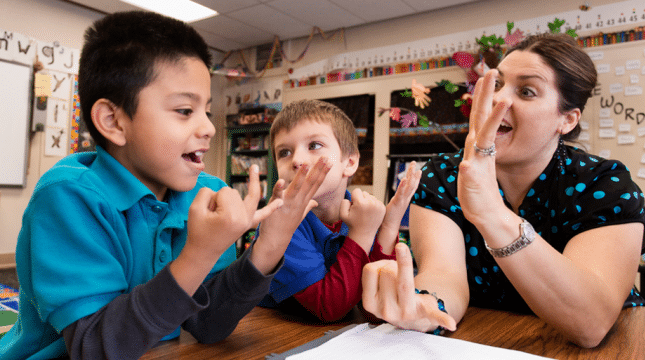
Social and emotional skills, habits, and mindsets—such as being able to manage emotions, establish and maintain positive relationships, and make responsible decisions—can set students up for academic and life success. Decades of research show that incorporating social and emotional learning (SEL) into instruction can lead to positive outcomes, from increased test scores and graduation rates to positive behaviors that support student success in school and beyond.
What can teacher preparation programs do to prepare teachers to integrate SEL into everyday classroom learning? A new case study from the Learning Policy Institute (LPI), Preparing Teachers to Support Social and Emotional Learning: A Case Study of San Jose State University and Lakewood Elementary, provides rich examples of how a publicly funded university in California integrates social and emotional dimensions of teaching and learning into its program, from courses on foundational theory and academic curriculum to fieldwork.
21 May2019
By Brandon R.T. Frost
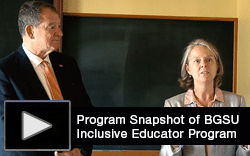 AACTE is excited to share the latest videos of its Research-to-Practice Spotlight Series on Special Education this spring. The video interviews feature faculty, students, and school district leaders who work with Portland State University (Portland, OR) and Bowling Green State University (Bowling Green, OH) to implement extensive clinical preparation for teacher candidates pursuing careers in general and special education. The link to view the video series is now available!
AACTE is excited to share the latest videos of its Research-to-Practice Spotlight Series on Special Education this spring. The video interviews feature faculty, students, and school district leaders who work with Portland State University (Portland, OR) and Bowling Green State University (Bowling Green, OH) to implement extensive clinical preparation for teacher candidates pursuing careers in general and special education. The link to view the video series is now available!
In my recent blog post, I shared a brief introduction to the new Research-to-Practice Spotlight Series. The videos highlight exemplary practices of the two teacher preparation programs for ensuring their candidates are ready to work with all students, including students with disabilities. Though different in many programmatic elements to address their local contexts, each university designed their programs to equip all teachers with the skills necessary to instruct the diverse needs of their student population.
The Master’s Program in Secondary Dual Education at Portland State University features dual certification in both general and special education at the secondary level. Entrants to the program come with an undergraduate degree in a content area and engage in two years of extensive and increasing involvement in clinical settings in secondary schools. Principals consider the program transformative in terms of the skills graduates bring to their classrooms.
20 May2019
By Lynn M. Gangone
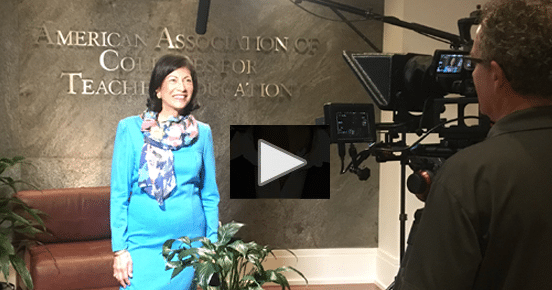
AACTE is committed to being your go-to-resource for the latest information, news, and trends in educator preparation. Being an AACTE member connects you to a vibrant community of educators and a strong network of support. Discover how to maximize your benefits and stay connected with AACTE in this month’s member update. Please take a few minutes to watch the video above (or read the transcript).
AACTE also wants to hear from you. Let us know the greatest challenge you face in educator preparation by emailing us at communications@aacte.org or contacting me directly at lgangone@aacte.org.
20 May2019
By Jane E. West
This blog post is written by AACTE consultant Jane West and is intended to provide update information. The views expressed in this post do not necessarily reflect the views of AACTE.
Today marks the 65th Anniversary of the Brown vs. Board of Education Supreme Court landmark decision that established the principle that separate is not equal. How far have we come? Much to contemplate here. You will see below that a House education panel spoke loud and clear on that topic: we have a long way to go.
- Trump Proposes Taking More Funds from Pell Grants – to Fund Moonshot? Huh?
This week President Trump submitted to Congress some revisions to his original budget request. Notably, he took back the proposed cut he originally made for Special Olympics (after great bipartisan outrage); but he also added a new cut in the form of an additional $1.9 billion to the Pell grant surplus. It appears that the Pell cut would go toward funding the President’s proposed 2024 NASA moonshot! Education advocates were outraged. As Jon Fansmith of the American Council on Education put it: “Do I want to make college more expensive to fund space travel to the moon and Mars?” Hmmmm …
The President had already requested a $2 billion cut in Pell funding. So the total $3.9 billion recission would result in the Pell surplus being exhausted by 2022! This request is likely to be ignored on Capitol Hill, as no one—Republican or Democrat—ever really contemplated cutting Special Olympics. And while the Pell Surplus has been modestly raided in the past, a $3.9 billion cut is highly unlikely.
20 May2019
By Lara Luetkehans

Educational technology is a critical component in the preparation of teacher candidates across the nation and the AACTE Annual Meeting is the prime opportunity to share best practices on how colleges of education are advancing technology in their programs. The AACTE 2020 Annual Meeting themed, “Disrupting Inequities: Educating for Change,” will take place February 28 – March 1 in Atlanta, GA.
The AACTE Committee on Innovation and Technology encourages proposals for the 2020 Annual Meeting in the areas of technology, innovation and teacher education. We hope you are inspired to think about how your work in the active use of technology to enable learning and teaching connects with the conferences’ four strands. We have provided recommended ways on how to feature innovation and technology in your conference proposals:
17 May2019
By NCEE
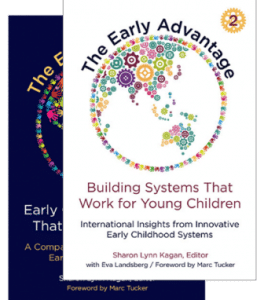 The United States needs to rethink its approach to early childhood education and care (ECEC), based on the experiences of innovative systems around the world, and develop a cohesive system that is high-quality, equitable, sustainable, and efficient. This is the principal finding of the groundbreaking study from the National Center on Education and the Economy (NCEE), The Early Advantage. An event to release the study was held in Washington, DC, on May 16.
The United States needs to rethink its approach to early childhood education and care (ECEC), based on the experiences of innovative systems around the world, and develop a cohesive system that is high-quality, equitable, sustainable, and efficient. This is the principal finding of the groundbreaking study from the National Center on Education and the Economy (NCEE), The Early Advantage. An event to release the study was held in Washington, DC, on May 16.
The study examines how innovative jurisdictions around the world are strategically and inventively designing and implementing early childhood policies and services to advance children’s well-being, and provides policy recommendations to help the United States expand the reach, equity, and rigor of its early childhood offerings.
15 May2019
By JTE Insider

Read the latest JTE Insider blog interview by the Journal of Teacher Education (JTE) editorial team. This blog is available to the public, and AACTE members have free access to the articles in the JTE online archives—just log in with your AACTE profile.
This interview features insights from the article “Measuring Teaching Quality of Secondary Mathematics and Science Residents: A Classroom Observation Framework” by Imelda Nava, Jaime Park, Danny Dockterman, Jarod Kawasaki, Jon Schweig, Karen Hunter Quartz, and José Felipe Martínez. The article was published in the March/April 2019 issue of the Journal of Teacher Education.
15 May2019
By Jerrica Thurman

Connect with AACTE during the 2019 Leadership Academy at the Renaissance Pittsburgh Hotel, June 23-27. Conveniently located in downtown Pittsburgh in the Cultural District, the hotel is nestled on the riverfront, with many restaurants in walking distance. Discover why Pittsburgh was named the 2019 Food City of the Year when you make plans now to join us for this AACTE event!
During the Academy’s downtime, you can enjoy Pirates baseball at PNC Park (just across the bridge from the hotel), explore the Senator John Heinz History Center (which includes the original set pieces and exclusive artifacts from “Mister Rogers’ Neighborhood”), and even experience the over 250 hands-on exhibits at the Carnegie Science Center. And as part of your Academy attendance, be sure to participate in our attendee outing to the Andy Warhol Museum as well. For a full list of Pittsburgh attractions and things to do, visit visitpittsburgh.com.
14 May2019
By Jerrica Thurman
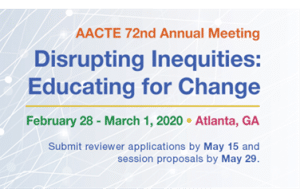 Time is running out to volunteer as a member faculty to review proposals for the AACTE 2020 Annual Meeting. Submit reviewer applications by May 15.
Time is running out to volunteer as a member faculty to review proposals for the AACTE 2020 Annual Meeting. Submit reviewer applications by May 15.
AACTE is also accepting session proposals through May 29. Below are nine reasons to participate in the call for proposals for the 72nd Annual Meeting, themed “Disrupting Inequities: Educating for Change,” to be held in Atlanta, GA, February 28 – March 1, 2020:
Why become a proposal reviewer?
12 May2019
By Azaria Cunningham
 Congratulations to Carlos D. Richardson, Holmes Scholar of the Month for May 2019! Richardson is currently a doctoral candidate at Bowie State University in Bowie, MD. His dissertation research examines “Factors that Influence Black Girls Participation in STEM. Richardson served as Holmes Scholars Council historian 2016-2017 and Holmes Scholar Council vice president 2017-2019, where he was influential in advocating for students from underrepresented populations.
Congratulations to Carlos D. Richardson, Holmes Scholar of the Month for May 2019! Richardson is currently a doctoral candidate at Bowie State University in Bowie, MD. His dissertation research examines “Factors that Influence Black Girls Participation in STEM. Richardson served as Holmes Scholars Council historian 2016-2017 and Holmes Scholar Council vice president 2017-2019, where he was influential in advocating for students from underrepresented populations.
Richardson teaches social studies at Friendship Collegiate Academy, an urban high school located in Washington, DC. He has served in a variety of roles over the years, including being a social studies subject area supervisor, extended learning coordinator, lead teacher, summer school principal and more. For the last 8 years, Richardson has also served as the coordinator of the Summer Enrichment Program, where students participate in over 16 extended learning programs that also serve as their summer job and receive pay as part of the Washington, DC Summer Youth Employment Program. Under Richardson’s leadership, the program has twice been named most outstanding school-led summer program by the Washington, DC Department of Employment Services.
In 2014, Richardson was named the Friendship Public Charter Schools Teacher of the Year, as well as being named the 2014 Washington, DC Public Charter Schools Teacher of the Year. Upon graduation, he plans to continue his career in the K-12 education system.
12 May2019
By Jerrica Thurman
Are you following highlights of the AACTE 2019 Washington Week on Facebook and Twitter at #AACTEWW19? In addition to blog posts and video highlights, AACTE recently released a Washington Week infographic on social media. Check it out below!
12 May2019
By Deborah Koolbeck
May has the Congress working hard! The U.S. House of Representatives (House) is moving forward at an intense pace on the 12 appropriations bills, moving the Labor, Health & Human Services, Education, and Related Agencies bill through the full committee first.
What are the funding levels for programs important for the profession? Where are the House and the U.S. Senate on reauthorization of the Higher Education Act? What else is unfolding that could impact the profession? These topics and more will be covered in the AACTE member exclusive May 2019 Federal Update webinar, offered on two different days and at different times of the day to accommodate member schedules. A recording of the webinar and the slides will be posted on the AACTE Advocacy Center’s federal page.
Register for the webinar that fits your schedule:
May 21, 2019 5:00 – 6:00 p.m. EDT
Registration Link
May 22, 2019 11 a.m. – 12 noon EDT
Registration Link









 The United States needs to rethink its approach to early childhood education and care (ECEC), based on the experiences of innovative systems around the world, and develop a cohesive system that is high-quality, equitable, sustainable, and efficient. This is the principal finding of the groundbreaking study from the National Center on Education and the Economy (NCEE), The Early Advantage. An event to release the study was held in Washington, DC, on May 16.
The United States needs to rethink its approach to early childhood education and care (ECEC), based on the experiences of innovative systems around the world, and develop a cohesive system that is high-quality, equitable, sustainable, and efficient. This is the principal finding of the groundbreaking study from the National Center on Education and the Economy (NCEE), The Early Advantage. An event to release the study was held in Washington, DC, on May 16.

 Time is running out to volunteer as a member faculty to review proposals for the
Time is running out to volunteer as a member faculty to review proposals for the  Congratulations to Carlos D. Richardson, Holmes Scholar of the Month for May 2019! Richardson is currently a doctoral candidate at Bowie State University in Bowie, MD. His dissertation research examines “Factors that Influence Black Girls Participation in STEM. Richardson served as Holmes Scholars Council historian 2016-2017 and Holmes Scholar Council vice president 2017-2019, where he was influential in advocating for students from underrepresented populations.
Congratulations to Carlos D. Richardson, Holmes Scholar of the Month for May 2019! Richardson is currently a doctoral candidate at Bowie State University in Bowie, MD. His dissertation research examines “Factors that Influence Black Girls Participation in STEM. Richardson served as Holmes Scholars Council historian 2016-2017 and Holmes Scholar Council vice president 2017-2019, where he was influential in advocating for students from underrepresented populations.